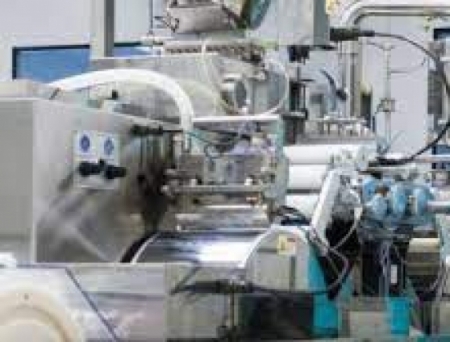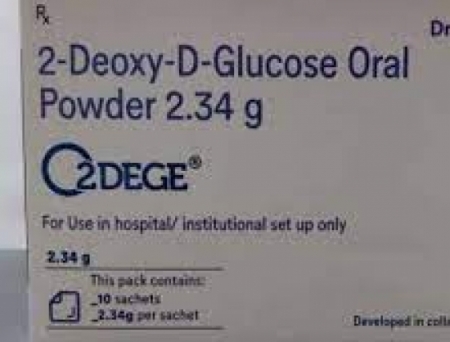预约演示
更新于:2025-08-29
Institute of Nuclear Medicine & Allied Sciences
更新于:2025-08-29
概览
标签
肿瘤
呼吸系统疾病
感染
小分子化药
疾病领域得分
一眼洞穿机构专注的疾病领域
暂无数据
技术平台
公司药物应用最多的技术
暂无数据
靶点
公司最常开发的靶点
暂无数据
| 排名前五的药物类型 | 数量 |
|---|---|
| 小分子化药 | 2 |
| 排名前五的靶点 | 数量 |
|---|---|
| HK2(己糖激酶II型) | 1 |
| TSPO(TSPO蛋白) | 1 |
关联
2
项与 Institute of Nuclear Medicine & Allied Sciences 相关的药物靶点 |
作用机制 HK2抑制剂 [+2] |
最高研发阶段批准上市 |
首次获批国家/地区 印度 |
首次获批日期2021-05-01 |
靶点 |
作用机制 TSPO抑制剂 |
在研适应症 |
非在研适应症- |
最高研发阶段临床前 |
首次获批国家/地区- |
首次获批日期- |
2
项与 Institute of Nuclear Medicine & Allied Sciences 相关的临床试验CTRI/2021/08/036056
Assessment of Clinical Efficacy of New Herbal Oral Hygiene Rinse in Reducing Gingivitis
开始日期2021-09-01 |
CTRI/2020/06/025664
A Randomized, Open Label, 2-Treatment Groups Clinical Trial Evaluating the Safety and Efficacy of 2-Deoxy-D-Glucose as an adjunctive therapy to standard of care, in comparison to standard of care alone, in the Acute Treatment of moderate to severe COVID -19 patients
开始日期2020-06-15 |
申办/合作机构 |
100 项与 Institute of Nuclear Medicine & Allied Sciences 相关的临床结果
登录后查看更多信息
0 项与 Institute of Nuclear Medicine & Allied Sciences 相关的专利(医药)
登录后查看更多信息
726
项与 Institute of Nuclear Medicine & Allied Sciences 相关的文献(医药)2025-10-01·LIFE SCIENCES
The silent invaders: Biofilms in neurological, cardiovascular, and metabolic diseases
Review
作者: Kumar, Vinay ; Tyagi, Anuradha
Biofilms, intricate microbial communities enclosed in a protective extracellular matrix, are conventionally linked to localized illnesses. Emerging data indicates that biofilms significantly contribute to systemic disorders beyond traditional infections. Bacterial biofilms may induce neuroinflammation and impair the blood-brain barrier in neurodegenerative illnesses including Alzheimer's and Parkinson's. In cardiovascular illnesses, biofilms from oral and gut microbes play a role in atherosclerosis, endocarditis, and hypertension. In metabolic illnesses, biofilms affect insulin resistance and metabolic endotoxemia, worsening conditions such as obesity and type 2 diabetes. Moreover, biofilms are associated with cancer progression, especially in colorectal and gastric malignancies, as they provide a tumor-promoting milieu via chronic inflammation and the generation of bacterial metabolites. Biofilms advance disease development by increasing chronic inflammation, evading immunological responses, and allowing microbial translocation, aspects that have been previously underestimated. Identifying biofilms as significant contributors to systemic disease presents novel avenues for innovative therapies and enhanced patient outcomes across various chronic illnesses. Thus, this review examines the increasing influence of biofilms on chronic inflammatory diseases, neurological disorders, cardiovascular diseases, metabolic syndromes, and cancer.
2025-07-01·WORLD JOURNAL OF MICROBIOLOGY & BIOTECHNOLOGY
The gut microbiota-bile acid axis: a crucial regulator of immune function and metabolic health
Review
作者: Kumar, Vinay ; Tyagi, Anuradha
The gut microbiota and bile acid metabolism are intricately linked, playing a crucial role in immune regulation, metabolic processes, and overall health. The gut microbiome, consisting of diverse bacterial genera such as Bacteroides, Clostridium, Lactobacillus, Bifidobacterium, and Eubacterium, facilitates the conversion of primary bile acids into secondary bile acids through enzymatic modifications. Bile acids, synthesized in the liver and modified by gut microbiota, act as signaling molecules that regulate immune responses via bile acid receptors, including the farnesoid X receptor (FXR), G protein-coupled bile acid receptor 1 (GPBAR1), pregnane X receptor (PXR), vitamin D receptor (VDR), and sphingosine-1-phosphate receptor 2 (S1PR2). Dysbiosis-an imbalance in gut microbial composition-disrupts bile acid metabolism, leading to impaired activation of bile acid receptors and contributing to various diseases. These include inflammatory bowel disease, metabolic disorders such as obesity and type 2 diabetes, autoimmune diseases like multiple sclerosis, and liver conditions such as cholestasis and non-alcoholic fatty liver disease. Dysfunctional bile acid receptor signaling further promotes chronic inflammation, metabolic dysregulation, and disturbances in gut-liver-immune homeostasis. Emerging therapeutic strategies targeting bile acid receptors, restoring microbiota balance, and implementing dietary interventions offer promising avenues for disease prevention and management. This review explores the pivotal role of gut microbiota in modulating immune responses through bile acid receptors and highlights their therapeutic potential in improving treatment outcomes.
2025-05-21·INDUSTRIAL & ENGINEERING CHEMISTRY RESEARCH
Uranium Sequestration with Bisphosphonate-Grafted Mesoporous Silica: Sorption Behavior, Mechanistic Insights, and In Vitro Evaluation
作者: Kumar, Nikhil ; Anoop, Adhithya ; Singh, Jai Deo ; Gahlot, Bharti ; Daksh, Shivani ; Goswami, Pradeep ; Datta, Anupama
A mesoporous silica-based sorbent, anchored with 2-amino-1-hydroxypropylidene-1,1-bisphosphonic acid onto mesoporous silica (MSNBP), was developed and employed for the sequestration of uranyl (VI) ions from aqueous solutionsThe sorbent was characterized using physicochem. methods, such as TGA, XPS, BET surface area anal., SEM, and FTIR, confirming its mesoporous structure with a surface area of 657.26 m2/g and a pore diameter of 3.57 nm.The adsorption behavior of MSNBP, compared to amine-functionalized mesoporous silica (MSN-NH2), was evaluated under varying uranyl concentration, pH, contact time, and temperature conditions.The functionalized material exhibited enhanced adsorption capacity, with maximum capacities of 36.67 mg/g and 291.37 mg/g for initial uranyl ion concentrations of 50 mg/L and 400 mg/L, resp.Adsorption followed pseudo-second-order kinetics and conformed to the Freundlich isotherm, indicating multilayer adsorption on heterogeneous sites.XPS and FTIR analyses demonstrated that the adsorption mechanism involved complexation between uranyl ions and the bisphosphonate functional groups, with a 1:1 U to P stoichiometry established in the sorbed complex.Notably, the sorbent achieved 97.42% uranium removal at pH 8, maintaining its efficacy across the adsorption-desorption cycles with a recovery rate of 95.42%.The effect of coexisting ions on U(VI) adsorption by MSNBP showed minimal interference, while Ca2+ and HCO3- reduced adsorption due to competition for phosphonate sites and the formation of neg. charged U(VI) complexes.In vitro evaluation demonstrated that the hemolysis of MSNBP was less than 5%, verifying its hemocompatibility and suitability for applications involving biol. interfaces.These findings position MSNBP as a promising and reusable material for uranium sequestration from aqueous environments, highlighting its potential for nuclear waste management.
2
项与 Institute of Nuclear Medicine & Allied Sciences 相关的新闻(医药)2021-06-28
The ATAL Faculty Development Programme deliberated on novel ideas in the field of drug design and engineering thus paving future strategies on innovation in pharmaceutical sciences.
The programme was jointly organized by Delhi Institute of Pharmaceutical Sciences and Research (DIPSAR) and Delhi Pharmaceutical Sciences and Research University (DPSRU) in which lectures were delivered by prominent scientists from around the country in the field of pharmaceutical sciences.
The first day of the programme was graced by the presence of Chief Guest Prof. Rajendra Kakde, Advisor, AICTE, patron of the program, Prof. R.K. Goyal, honourable Vice Chancellor, DPSRU, Dr. O.P Shukla, Registrar, DPSRU, Dr. P. K. Sahoo, Director, DIPSAR, and Dr. Harvinder Popli, Director, School of Pharmaceutical Sciences, as well as the faculty and participants from the academia, and industry.
Three scientific sessions were held on crucial topics of Drug Engineering, coordinated well by Dr. Saurabh Dahiya, Coordinator and Organising Secretary, AICTE ATAL FDP on Drug Engineering.
The themes for the day aimed at accumulation of novel ideas in the field of drug design and engineering.
Professor Rajendra B. Kakde, encouraged the learners regarding the importance of continuous learning being offered by way of this FDP being sponsored by AICTE ATAL Academy and being conducted in online mode at DIPSAR. He also briefed the 200 participants about various initiatives being taken up by AICTE for faculty development and ATAL FDP programme being one of the flag bearer scheme which has already gained national and international popularity and made its place in World Book of Records, London.
In opening remarks, Professor R.K. Goyal opined that pharmacy is unique to have different combinations of studies, including medicine, science, management and the most important being engineering. For instance, large scale manufacturing of vaccines and compilation of medical devices require the knowledge of engineering domains too. He suggested that today’s NEP has a holistic, multi-disciplinary and inter-disciplinary approach. Professor Goyal also took the first session and spoke on Novel Formulation development by Drug Engineering: Success story at University.
The next session was taken by Dr. JB Gupta, who presided as a Consultant in Contract Research Organization. A lecture on Personalized Medicine was delivered by him. The final session was taken by Dr. Shubra Chaturvedi, Scientist E, Division of cyclotron and radiopharmaceutical sciences, Institute of Nuclear Medicine and Allied Sciences (INMAS) Defence Research and Development Organisation (DRDO) who spoke on development and quality control of radiopharmaceuticals. Each lecture was followed by a Q & A session by the listeners.

2021-06-09
The Defence Research and Development Organisation (DRDO), which developed 2-Deoxy-D-Glucose (2-DG), a drug used for treatment of Covid-19 patients, has called for Expression of Interest (EoI) to transfer the technology to Indian pharmaceutical industries for production.
2-DG was developed by the Institute of Nuclear Medicine and Allied Sciences (INMAS), a lab of DRDO, in collaboration with Dr Reddy's Laboratories.
Clinical trial results have shown that this molecule helps in faster recovery of hospitalised patients and reduces supplemental oxygen dependence. Higher proportion of patients treated with 2-DG showed RT-PCR negative conversion in Covid patients.
According to the EoI document, applications should be submitted before June 17 through email. “The EoI submitted by industries will be scrutinised by a Technical Assessment Committee (TAC).
“Only up to 15 industries will be given ToT on their capabilities, technical hand holding capability of DRDO and on first come first served basis," it said.
The bidders should have a Drug licence to manufacture Active Pharmaceutical Ingredient (API) from Drug Licensing Authorities and WHO GMP (Good manufacturing Practices) certification among others.
Laboratory synthesis process for 2-DG has been developed using D-Glucose as starting material.
The synthesis process consists of conversion of D-Glucose to 2-DG through five chemical reaction steps followed by purification.
The process has been established at batch scale (100g) and pilot plant scale (500g) and necessary patents have been filed by DRDO in this regard, the Defence body said.

临床结果
100 项与 Institute of Nuclear Medicine & Allied Sciences 相关的药物交易
登录后查看更多信息
100 项与 Institute of Nuclear Medicine & Allied Sciences 相关的转化医学
登录后查看更多信息
组织架构
使用我们的机构树数据加速您的研究。
登录
或

管线布局
2025年09月05日管线快照
管线布局中药物为当前组织机构及其子机构作为药物机构进行统计,早期临床1期并入临床1期,临床1/2期并入临床2期,临床2/3期并入临床3期
临床前
2
2
其他
登录后查看更多信息
当前项目
| 药物(靶点) | 适应症 | 全球最高研发状态 |
|---|---|---|
2-脱氧-D-葡萄糖 ( HK2 ) | 癌变 更多 | 临床前 |
FITC-MBP(INMAS) ( TSPO ) | 肺炎 更多 | 临床前 |
99m Tc-DO3A-Asp-Arg-Asp-Orn ( αvβ3 ) | 肿瘤 更多 | 无进展 |
Alpha ketoglutarate ( Reactive oxygen species x TP53RK ) | 中毒 更多 | 无进展 |
登录后查看更多信息
药物交易
使用我们的药物交易数据加速您的研究。
登录
或

转化医学
使用我们的转化医学数据加速您的研究。
登录
或

营收
使用 Synapse 探索超过 36 万个组织的财务状况。
登录
或

科研基金(NIH)
访问超过 200 万项资助和基金信息,以提升您的研究之旅。
登录
或

投资
深入了解从初创企业到成熟企业的最新公司投资动态。
登录
或

融资
发掘融资趋势以验证和推进您的投资机会。
登录
或

Eureka LS:
全新生物医药AI Agent 覆盖科研全链路,让突破性发现快人一步
立即开始免费试用!
智慧芽新药情报库是智慧芽专为生命科学人士构建的基于AI的创新药情报平台,助您全方位提升您的研发与决策效率。
立即开始数据试用!
智慧芽新药库数据也通过智慧芽数据服务平台,以API或者数据包形式对外开放,助您更加充分利用智慧芽新药情报信息。
生物序列数据库
生物药研发创新
免费使用
化学结构数据库
小分子化药研发创新
免费使用



